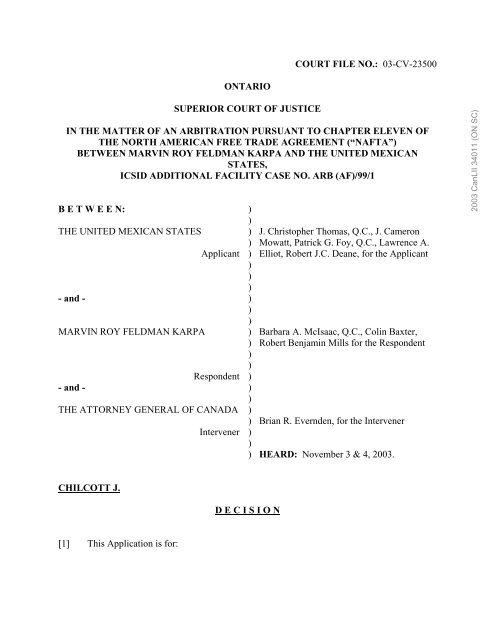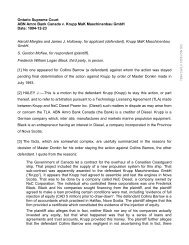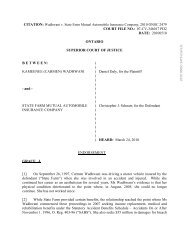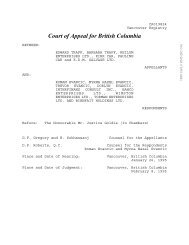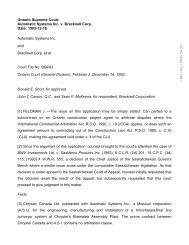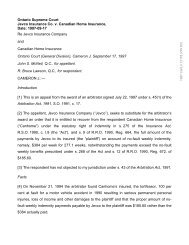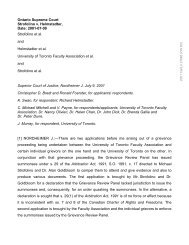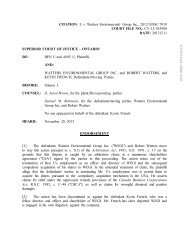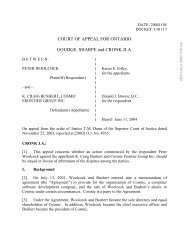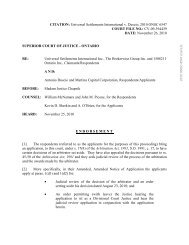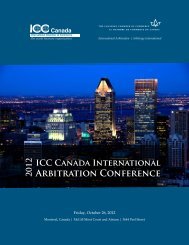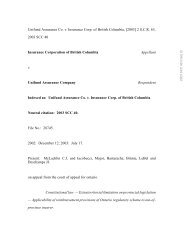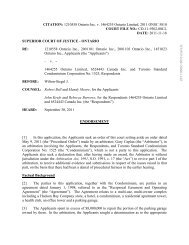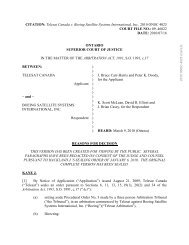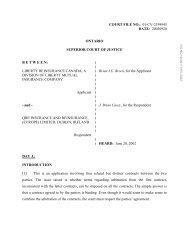United Mexican States v Karpa 2003 CanLII 34011 - Arbitration Place
United Mexican States v Karpa 2003 CanLII 34011 - Arbitration Place
United Mexican States v Karpa 2003 CanLII 34011 - Arbitration Place
- No tags were found...
You also want an ePaper? Increase the reach of your titles
YUMPU automatically turns print PDFs into web optimized ePapers that Google loves.
COURT FILE NO.: 03-CV-23500ONTARIOSUPERIOR COURT OF JUSTICEIN THE MATTER OF AN ARBITRATION PURSUANT TO CHAPTER ELEVEN OFTHE NORTH AMERICAN FREE TRADE AGREEMENT (“NAFTA”)BETWEEN MARVIN ROY FELDMAN KARPA AND THE UNITED MEXICANSTATES,ICSID ADDITIONAL FACILITY CASE NO. ARB (AF)/99/1B E T W E E N: ))THE UNITED MEXICAN STATES ))Applicant ))))- and - )))MARVIN ROY FELDMAN KARPA ))))Respondent )- and -))THE ATTORNEY GENERAL OF CANADA ))Intervener )J. Christopher Thomas, Q.C., J. CameronMowatt, Patrick G. Foy, Q.C., Lawrence A.Elliot, Robert J.C. Deane, for the ApplicantBarbara A. McIsaac, Q.C., Colin Baxter,Robert Benjamin Mills for the RespondentBrian R. Evernden, for the Intervener)) HEARD: November 3 & 4, <strong>2003</strong>.<strong>2003</strong> <strong>CanLII</strong> <strong>34011</strong> (ON SC)CHILCOTT J.D E C I S I O N[1] This Application is for:
- 2 -1. An order setting aside, in part, the award made by the <strong>Arbitration</strong> Tribunal (“the Tribunal”)on December 16, 2002, in Ottawa, Ontario at the International Centre for Settlement ofInvestment Disputes (Additional Facilities). This was case No. ARB (AF)/99/1 betweenMarvin Roy Feldman <strong>Karpa</strong> (“Feldman” or “the Claimant”) and the <strong>United</strong> <strong>Mexican</strong> <strong>States</strong>(“Mexico” or “the Applicant”). The arbitration arose under Chapter Eleven of the NorthAmerican Free Trade Agreement (“NAFTA”) pursuant to s. 34 of the InternationalCommercial <strong>Arbitration</strong> Act R.S.O., 1990, c. I-9 (“ICAA”).[2] The Tribunal found that Mexico discriminated against Feldman contrary to Article 1102of the NAFTA. The Tribunal ordered Mexico to pay to Feldman, as damages, tax rebates thathad been withheld from Mexico because of discrimination.[3] The grounds for the application are:<strong>2003</strong> <strong>CanLII</strong> <strong>34011</strong> (ON SC)(a)(b)(c)Mexico was unable to present its case, contrary to Article 34(2)(a)(ii) of theModel Law, because – having informed the parties that it would only drawadverse inferences in the event of a party’s failure to comply with its orders – themajority of the Tribunal drew impermissible inferences (in the absence of anorder) from Mexico’s compliance with its own domestic law governing taxationlaw enforcement and taxpayer personal privacy protection;the arbitral procedure adopted by the majority of the Tribunal was not inaccordance with the agreement of the parties, contrary to Article 34(2)(a)(iv) ofthe Model Law, because it conflicted with the mandatory rules for the conduct ofinvestor-State arbitrartions under the NAFTA, in particular Article 2105 whichprohibited the Tribunal from requiring Mexico “to furnish or allow access toinformation the disclosure of which would impede law enforcement or would becontrary to the Party’s law protecting personal privacy”;by requiring Mexico to pay to the Claimant, as damages, tax rebates to which theTribunal previously held the Claimant had no legal right, the Award is, as thedissenting Arbitrator found, “repugnant”, and is in conflict with public policy,contrary to Article 34(2)(b) of the Model Law.FACTS FROM THE AWARD[4] This case concerns a dispute regarding the application of certain tax laws by Mexico tothe export of tobacco products by Corporación de Exportaciones <strong>Mexican</strong>as S.A. de C.V.(“CEMSA”), a company organized under the laws of Mexico and owned and controlled byFeldman, a citizen of the <strong>United</strong> <strong>States</strong> of America (“<strong>United</strong> <strong>States</strong>”). The Claimant, who issuing as the sole investor on behalf of CEMSA, alleges that Mexico’s refusal to rebate excisetaxes applied to cigarettes exported by CEMSA and Mexico’s continuing refusal to recognizeCEMSA’s right to a rebate of such taxes regarding prospective cigarette exports constitutes abreach of Mexico’s obligations under Chapter Eleven, Section A of the NAFTA. In particular,
- 3 -Mr. Feldman alleges violations of the NAFTA Articles 1102 (National Treatment), 1105(Minimum Level of Treatment), and 1110 (Expropriation and Indemnification).[5] The dispute is subject to arbitration under the NAFTA. The NAFTA was concludedbetween the Governments of the <strong>United</strong> <strong>States</strong> of America, Canada and the <strong>United</strong> <strong>Mexican</strong><strong>States</strong>, and came into force on January 1, 1994.[6] NAFTA Article 1117 entitles an investor to bring a claim against a NAFTA State Partyon behalf of an enterprise of another NAFTA Party which the investor owns or controls.NAFTA Article 1139 provides that an “enterprise of a Party means an enterprise constituted ororganized under the law of a NAFTA party”.[7] NAFTA Article 1120 states that arbitral proceedings may be instituted under theAdditional Facility Rules of the International Centre for Settlement of Investment Disputes(“ICSID”), as modified by the provisions of Chapter Eleven, Section B of the NAFTA, providedthat either the disputing Party whose measure is alleged to be a breach referred to in Article 1117(in this case, Mexico,) or the Party of the investor (in this case, the <strong>United</strong> <strong>States</strong>), but not both,is a party to the ICSID Convention. The ICSID Additional Facility Rules are applicable in thiscase since only the <strong>United</strong> <strong>States</strong>, as the Party of the investor, but not the <strong>United</strong> <strong>Mexican</strong> <strong>States</strong>,is a Contracting State to the ICSID Convention. Under NAFTA Article 1122(1), in conjunctionwith NAFTA Articles 1116, 1117 and 1120, Mexico expresses its consent to the submission toarbitration of claims of investors who are nationals of another State Party to the NAFTA eitherunder the ICSID Convention, under the Additional Facility Rules or under UNCITRALarbitration rules.<strong>2003</strong> <strong>CanLII</strong> <strong>34011</strong> (ON SC)[8] The Applicant argues that because the award relates to a violation of the NAFTA Article1102, Section 2(1) of the ICAA provides that subject to this Act, the Model Law is in force inOntario. Model Law is a schedule to ICAA.[9] Article 5 of the Model Law states:In matters governed by this Law, no court shall intervene except where soprovided in this Law.[10] Article 34 of the Model Law sets out grounds upon which an award may be set aside.(1) Recourse to a court against an arbitral award may be made only by anapplication for setting aside in accordance with paragraphs (2) and (3) ofthis article.(2) An arbitral award may be set aside by the court specified in article 6 onlyif:(a)the party making the application furnishes proof that:
- 4 -(i) a party to the arbitration agreement referred to in article 7was under some incapacity; or the said agreement is notvalid under the law to which the parties have subjected it or,failing any indication thereon, under the law of this State; or(ii)(iii)the party making the application was not given propernotice of the appointment of an arbitrator or of the arbitralproceedings or was otherwise unable to present his case; orthe award deals with a dispute not contemplated by or notfalling within the terms of the submission to arbitration, orcontains decisions on matters beyond the scope of thesubmission to arbitration, provided that, if the decisions onmatters submitted to arbitration can be separated from thosenot so submitted, only that part of the award which containsdecisions on matters not submitted to arbitration may be setaside; or<strong>2003</strong> <strong>CanLII</strong> <strong>34011</strong> (ON SC)(iv)the composition of the arbitral tribunal or the arbitralprocedure was not in accordance with the agreement of theparties, unless such agreement was in conflict with aprovision of this Law from which the parties cannotderogate, or, failing such agreement, was not in accordancewith this Law, or(b)the court finds that:(i)(ii)the subject-matter of the dispute is not capable ofsettlement by arbitration under the law of this State, orthe award is in conflict with the public policy of this State.(3) An application for setting aside may not be made after three months haveelapsed from the date on which the party making that application hadreceived the award or, if a request had been made under article 33, fromthe date on which that request had been disposed of by the arbitraltribunal.(4) The court, when asked to set aside an award, may, where appropriate andso requested by a party, suspend the setting aside proceedings for a periodof time determined by it in order to give the arbitral tribunal anopportunity to resume the arbitral proceedings or to take such other
- 5 -actions as in the arbitral tribunal’s opinion will eliminate the grounds forsetting aside.[11] By Article 34(2)(a) of the Model Law, the Applicant bears the burden of establishing thatone or more grounds specified in Article 34(2)(a) are present. By Article 34(2)(b), the courtmay, on its own, conclude that the award is in conflict with public policy in Ontario.[12] Section 13 of ICAA provides that, in interpreting and implying the Model Law, the Courtmay have regard to two commentaries.(a)the Report of the <strong>United</strong> Nations Commission on International Trade Lawon the work of its eighteenth session (June 3-21, 1985); and<strong>2003</strong> <strong>CanLII</strong> <strong>34011</strong> (ON SC)(b)the Analytical Commentary contained in the Report of the SecretaryGeneral to the eighteenth session of the <strong>United</strong> Nations Commission onInternational Trade Law.[13] The Applicant Mexico argues that it was unable to present its case contrary to Section34(2)(a)(ii) of the Model Law. The Tribunal had informed the parties it would only drawadverse inferences in the event of a Party’s failure to comply with its orders. Contrary to this,the majority of the Tribunal drew impermissible inferences because Mexico, in complying withits own domestic law governing taxation law enforcement and taxpayer privacy protection,refused or failed to disclose confidential information.[14] Mexico further states that the arbitral procedure adopted by the majority of the Tribunalwas not in accordance with the agreement of the parties because it conflicted with the mandatoryrules for the conduct of Investor-<strong>States</strong> arbitrations. Under the NAFTA, in particular Article2105, the Tribunal is prohibited from requiring Mexico “to furnish or allow access toinformation, the disclosure of which would impede law enforcement or would be contrary to theParty’s law protecting personal privacy”.[15] Article 2105 states:Nothing in this Agreement shall be construed to require a Party to furnish or allowaccess to information the disclosure of which would impede law enforcement orwould be contrary to the Party’s law protecting personal privacy or the financialaffairs and accounts of individual customers of financial institutions.[16] The Applicant further argues that if the Party is for lawful reasons unable to discloseconfidential information that an adverse inference cannot be drawn when that incapacity isinvoked as an explanation for the absence of the information.[17] Mexico further argues that it did not have full opportunity to present its case because thearbitral procedure was not in accordance with the Party’s agreement. Mexico cites authorities
- 6 -stating that the award will be set aside on this ground providing that the breach of the Party’sagreement is substantial. This is set out in the Compagnie des Bauxites de Guinée v.Hammermills Inc., 1992 WL 122712 (D.D.C. 1992) at p. 4:Rather, the court believes a more appropriate standard of review would be to setaside an award based on a procedural violation only if such violation workssubstantial prejudice to the complaining party.[18] The Applicant also argues that in the case of Investor-State <strong>Arbitration</strong> under NAFTA,the arbitration agreement is established by the Claimant’s acceptance of the State Party’s offer toarbitrate an investment dispute made in Article 1122. The NAFTA Party’s consent is expresslyconditioned.<strong>2003</strong> <strong>CanLII</strong> <strong>34011</strong> (ON SC)[19] Article 1122 states:Each party consents to the submission of a claim to arbitration in accordance withprocedures set out in this agreement.[20] The procedure set out in the NAFTA includes substantive and procedural limitationsimposed by Article 2105. Mexico therefore states that the arbitration was not conducted inaccord with the procedures set out in the agreement. This vitiates the Party’s consent and theaward must be set aside.[21] Another ground upon which Mexico urges this court to set aside the award is that byrequiring Mexico to pay the Claimant, as damages, tax rebates to which the Tribunal previouslyheld the Claimant had no legal right, the award is “repugnant” and is in conflict with publicpolicy contrary to Article 34(2)(b) of the Model Law.[22] The Tribunal as a whole had found that CEMSA had no legal right to claim rebates underImpuesto Especial Sobre Produccion y Servicios (the “Special Tax on Production and Services”or “IEPS”) law and that CEMSA’s business depended on them.[23] Arbitrator Covarrubias states in his dissent:If in actual fact, the Claimant is not entitled to IEPS rebates, it is repugnant togrant him a somewhat equivalent amount of compensation for damages onlybecause he alleges that there is another investor – a <strong>Mexican</strong> investor in likecircumstances-who has been granted IEPS rebates without being entitled to themeither.[24] In Corporacion Transnacional de Inversiones, S.A. de C.V. v. STET International, S.p.A.(1999), 45 O.R. (3d) 183 aff’d 49 O.R. (3d) 414 (C.A.), the Superior Court of Justice held thatArticle 34(2)(b)(ii),
- 7 -…is to be interpreted to include procedural as well as substantive justice and isnot to exclude the manner in which an award is arrived at…[25] Further, Mexico argues that the award is in conflict with the public policy of Ontario.INTERVENER[26] The Intervener, The Attorney General of Canada, contends that the majority of theTribunal failed to consider the NAFTA Article 2105, its purpose or effect before rendering theirdecision.[27] Further, the majority of the Tribunal supported their findings of discrimination andbreach of the NAFTA Article 1102 by drawing a negative inference from Mexico’s allegedrefusal or failure to produce information about taxpayers without their consent.<strong>2003</strong> <strong>CanLII</strong> <strong>34011</strong> (ON SC)[28] And on a proper construction of Article 2105 such an adverse inference is not permitted.[29] The Attorney General of Canada does not take a position on the other issues raised by theApplicant, Mexico.[30] The Attorney General of Canada accepts the facts set out in the Memorandum ofAgreement filed by counsel for Mexico on September 29, <strong>2003</strong>.[31] The Intervener notes that the arbitrators neither requested nor received submissions onthe application of Article 2105 and that the majority award contains no reference to Article 2105.[32] The Intervener argues that the Tribunal failed to respect the governing law and thereforeexceeded its jurisdiction in two ways. First, it failed to take Article 2105 into account as part ofthe agreement to arbitrate, and secondly it failed to take account of Article 2105 as part of theapplicable rules of international law. Mexico informed the Tribunal that it could not providecertain information requested because it was protected by domestic law governing taxpayerconfidentiality under Section 69 of the Fiscal Code of the Federation (“FCC”).[33] Therefore, pursuant to Article 2105 of the NAFTA, Mexico could not be required tofurnish or allow access to this information, and the Tribunal cannot draw an adverse inferencefrom Mexico’s failure to do so.[34] The Intervener states that Canada’s domestic law concerning treatment of taxpayerinformation is similar to that of Mexico. The Income Tax Act, Sections 239 and 241 and theExcise Tax Act, Section 295 are examples.[35] The Intervener argues that the majority of the Tribunal relied heavily upon Mexico’srefusal or failure to disclose information about excise tax rebates given to other taxpayers andany investigations of such taxpayers. The Claimant Feldman agreed to accept a statement from a
- 8 -senior official that would disclose how Mexico was treating other taxpayers but withoutdisclosing specific details relating to the individual taxpayer that would place the official inviolation of the fiscal law.[36] The Tribunal welcomed this agreement. The Tribunal had earlier ruled that it reservedthe right to draw adverse inferences if a party did not comply with one of its directions toproduce evidence.[37] In summary, the Intervener argues that the approach adopted by the majority wasinconsistent with the agreement of the parties and the rules governing arbitration as it forces aparty to disclose information notwithstanding Article 2105 or risk losing the arbitration.[38] And further, by drawing an adverse inference from Mexico’s refusal to produce thetaxpayer’s documents at issue, the Tribunal failed to take into account Article 2105 and therebyexceeded the scope of the submission to arbitration in breach of Article 34(2)(a)(ii) of the ModelLaw.<strong>2003</strong> <strong>CanLII</strong> <strong>34011</strong> (ON SC)POSITION OF THE RESPONDENT FELDMAN[39] The Respondent here submits to the court that there is no basis upon which this court canset aside the award and the application should be dismissed.[40] Feldman supports that position on a number of grounds.1. That members of International Trade Tribunals are drawn from a roster ofinternational trade experts and their decisions should be accorded a highlevel of deference by reviewing courts.2. That that deference to the arbitral award is particularly appropriate whereas here, the applicant challenges a finding of fact. Moreover, given thelimited ground for review under Article 34 of the Model Law, this courtshould decline any invitation to re-weigh the evidence or visit findings offact made by the Tribunal.3. That a review in this case by the court is further limited by the terms ofArticle 34 of the Model Law.4. That the highest degree of deference should be shown to the Tribunal’sfindings because of the full privative clause that applies in the presentcase.5. That the Tribunal never imposed an obligation on Mexico to releaseinformation covered by the NAFTA Article 2105 and it was raised onlyafter the decision of the Tribunal had been issued.
- 9 -[41] I recognize these as the main grounds upon which the Respondent Feldman submits theapplication should be dismissed.CONCLUSIONS[42] Let me deal first with the Intervener’s position. Mexico did not raise Article 2105 of theNAFTA before the Tribunal. There is no ruling by the Tribunal in respect of Article 2105 of theNAFTA nor is there any evidence or argument with respect to the article that took place beforethe Tribunal. There is nothing upon which this court could make a reasoned ruling as to howArticle 2105 should be interpreted in relation to Article 69 of the FCC.[43] In my opinion, this court only has jurisdiction to set aside an award upon proof of certaincircumstances set out in Article 34 of the Model Law, and this court considers it improper toraise the Article 2105 argument on this review.<strong>2003</strong> <strong>CanLII</strong> <strong>34011</strong> (ON SC)[44] No requests were made by the Tribunal for confidential information under Section 69 ofthe FCC. No requests or submissions were made in respect of the application of Article 2105 ofthe NAFTA during the hearing, and neither the majority award nor the dissent mention Article2105. What was sought before the Tribunal was an accommodation to provide information as towhom rebates were given and who was undergoing an audit.[45] In the view of this court, Mexico could have provided the information as to how manycorporations were getting rebates – whether they were domestic or foreign corporations and howmuch the rebates were - whether there were ongoing audits and if so how many - withoutbreaching Section 69 or without divulging the names of the taxpayer. Mexico could also haveindicated to the Tribunal if consent had been sought from the taxpayers in order to allow Mexicoto divulge the information.[46] The majority award found as an inescapable fact that the Respondent Feldman wasdenied certain rebates while domestic trading companies in like circumstances were givenrebates.[47] This court is of the opinion that the Tribunal did not exceed the scope of the submissionto arbitration.[48] The request of the Attorney General to have this court interpret and apply Article 2105 inaccord with the principles set out in its submissions, is therefore denied.[49] Now turning to the submissions of the Respondent Feldman.[50] The Tribunal was appointed pursuant to the provisions of Chapter Eleven of the NAFTA.The Tribunal found that the Applicant Mexico discriminated against Feldman, an investor of the<strong>United</strong> <strong>States</strong>, contrary to Article 1102 of the NAFTA, and Mexico is challenging the award ofthe majority of the Tribunal.
- 10 -[51] As the Party had designated Ottawa, Ontario, Canada as the place of arbitration, thiscourt has jurisdiction to hear this review.[52] The ICAA applies and the ICAA incorporates the Model Law on internationalcommercial arbitration. Article 5 of the Model Law states that:In matters governed by this law no court shall intervene except where so providedin the law.[53] Accordingly, the jurisdiction of this court to review the award is strictly limited to thoseinstances provided for in Article 34 of the Model Law which allows for a very limitedopportunity for the courts to provide any recourse against an award.<strong>2003</strong> <strong>CanLII</strong> <strong>34011</strong> (ON SC)[54] The Tribunal found that Mexico violated Feldman’s rights to non-discrimination underArticle 1102 of the NAFTA.[55] Article 1102 of the NAFTA provides:“Each Party shall accord to investors of another Party treatment no less favorablethan that it accords, in like circumstances, to its own investors with respect to theestablishment, acquisition, expansion, management, conduct, operation, and saleor other disposition of investments.Each Party shall accord to investments of investors of another Party treatment noless favorable than that it accords, in like circumstances, to investments of its owninvestors with respect to the establishment, acquisition, expansion, management,conduct, operation, and sale or other disposition of investments.The treatment accorded by a Party under paragraphs 1 and 2 means, with respectto a state or province, treatment no less favorable than the most favorabletreatment accorded, in like circumstances, by that state or province to investors,and to investments of investors, of the Party of which it forms a part.For greater certainty, no Party may:(a)(b)impose on an investor of another Party a requirement that a minimum levelof equity in an enterprise in the territory of the Party be held by its nationals, otherthan nominal qualifying shares for directors or incorporators of corporation; orrequire an investor of another Party, by reason of its nationality, to sell orotherwise dispose of an investment in the territory of the Party.”
- 11 -[56] At the arbitration Feldman argued that Mexico had violated other articles of the NAFTA,namely Article 1105 (a Minimum Level of Treatment) and Article 1110 (Expropriation andIndemnification). The Tribunal determined that these provisions had not been violated.[57] The Tribunal found that Feldman (CEMSA) were subject to de facto discrimination.[58] The Tribunal articulated the issue as follows. The Award paragraph 169 -“Also, given that this is a case of likely de facto discrimination, it does not matterfor purposes of Article 1102 whether in fact <strong>Mexican</strong> law authorizes SHCP toprovide IEPS rebates to persons who are not formally IEPS taxpayers and do nothave invoices setting out the tax amounts separately, as has been required by theIEPS law consistently since at least 1987 and perhaps earlier. The question,rather, is whether rebates have in fact been provided for domestically ownedcigarette exporters while denied to a foreign re-seller, CEMSA. Mexico is ofcourse entitled to strictly enforce its laws, but it must do so in a nondiscriminatorymanner, as between foreign investors and domestic investors.Thus, if the IEPS Article 4 invoice requirement is ignored or waived for domesticcigarette reseller/exporters, but not for foreign owned cigarette reseller/exporters,that de facto difference in treatment is sufficient to establish a denial of nationaltreatment under Article 1102.”<strong>2003</strong> <strong>CanLII</strong> <strong>34011</strong> (ON SC)[59] The Tribunal found that there was agreement between the parties that there is at least one<strong>Mexican</strong> owned reseller/exporter, the so-called “Poblano Group”, consisting of MercadosRegionales and Mercados Extranjeros (“Mercados I” and “Mercados II”) and possibly otherentities.[60] The Tribunal also found that a <strong>Mexican</strong> official, Enrique Diaz Guzman, had confirmedthat at least three trading companies (i.e. not producers) received IEPS rebates for cigaretteexports at various times between September 1996 and May 2000, in the total amount ofapproximately NP$91,000,000.[61] Many of those rebates were authorized and paid after January 1, 1998, when amendmentsto the IEPS law effectively made the 0% tax rate and IEPS rebates on cigarette exports legallyunavailable to anyone other than producers (by limiting the payment of the tax rebates to the firstsale).[62] One of Mexico’s witnesses, Mr. Diaz Guzman, did, however, state that only one of thethree trading companies he identified was in the process of audit (as of March 2001), sopresumably there are two others which have not been audited, despite being in likecircumstances with CEMSA.[63] The companies which are in like circumstances, domestic and foreign, are the tradingcompanies, those in the business of purchasing <strong>Mexican</strong> cigarettes for export, which for purposesof this case are CEMSA and the corporate members of the Poblano Group.
- 12 -[64] The only confirmed cigarette exporters on the limited record before the Tribunal areCEMSA, owned by U.S. citizen Feldman, and the <strong>Mexican</strong> corporate members of the PoblanoGroup, Mercados I and Mercados II. According to the available evidence, CEMSA was deniedthe rebates for October-November 1997 and subsequently; Mexico also demanded that CEMSArepay rebate amounts initially allowed from June 1996 through September 1997. Thus, CEMSAwas denied IEPS rebates during periods when members of the Poblano Group were receivingthem.[65] On balance, the majority of the Tribunal found that CEMSA has been treated in a lessfavourable manner than domestically owned reseller/exporters of cigarettes (i.e. the PoblanoGroup resellers/exporters), a de facto discrimination by Mexico, which is inconsistent withMexico’s obligations under Article 1102.<strong>2003</strong> <strong>CanLII</strong> <strong>34011</strong> (ON SC)[66] Also the majority of the Tribunal found what appears to have been differential treatmentbetween CEMSA and Mr. Poblano with regard to registration issues as well. According toFeldman’s witness, Mr. Carvajal, taxpayer CEMSA filed its application for export registrationstatus on June 30, 1998; information was still being requested in writing seven months later. Fortaxpayer Mr. Poblano, information was requested by SHCP (the <strong>Mexican</strong> Tax Authority) orallywithin 14 days of the date of Poblano’s application, and any questions were apparently resolved.[67] The majority of the Tribunal found that the Respondent had established a presumptionand a prima facie case that CEMSA had been treated in a different and less favourable mannerthan several <strong>Mexican</strong> owned cigarette resellers, and Mexico had failed to introduce any credibleevidence into the record to rebut that presumption.[68] In my opinion, Mexico is not precluded by <strong>Mexican</strong> law from tendering evidence beforethe Tribunal as to whether the corporate domestic resellers in question were in the samecircumstances as CEMSA or as to whether those resellers were receiving rebates incircumstances in which rebates were being denied to CEMSA.[69] In reading the award and the documentation filed there is no evidence before this court bywhich I can conclude that Article 69 would have prevented Mexico from leading evidence itwanted to lead and which would have perhaps satisfied Feldman.[70] Paragraph 187 of the Award states:On the basis of this analysis, a majority of the Tribunal concludes that Mexico hasviolated the Claimant’s right to non-discrimination under Article 1102 ofNAFTA. The Claimant has made a prima facie case for differential and lessfavorable treatment of the Claimant, compared with treatment by SHCP of thePoblano Group. For the Poblano Group and for other likely cigarettereseller/exporters, the Respondent has asserted that audits are or will be conductedin the same manner as for the Claimant, and implied that they will ultimately betreated in the same way as the Claimant. However, the evidence that this hasoccurred is weak and unpersuasive. The inescapable fact is that the Claimant has
- 13 -been effectively denied IEPS rebates for the April 1996 through November 1997period, while domestic export trading companies have been given rebates not onlyfor much of that period but through at least May 2000, suggesting that Article4(III) of the law has been de facto waived for some if not all domestic firms.While the Claimant has also been effectively precluded from exporting cigarettesfrom 1998 to 2000, there is evidence that the Poblano Group companies haveapparently been allowed to do so, notwithstanding Article II of the IEPS law.Finally, the Claimant has not been permitted to register as an exporting tradingcompany, while the Poblano Group firms have been granted this registration. Allof these results are inconsistent with the Respondent’s obligations under Article1102, and the Respondent has failed to meet its burden of adducing evidence toshow otherwise.<strong>2003</strong> <strong>CanLII</strong> <strong>34011</strong> (ON SC)[71] This court can find no reason to disagree with that conclusion.[72] The affidavit of Carlos Loperena Ruiz (Loperena), sworn October 24, <strong>2003</strong> filed by theRespondent Feldman and referred to in the Respondent’s Factum at paragraph 102, in essencestates that at the time of the Tribunal hearing Mexico did not have a general law regarding theprotection of personal privacy; but that such legislation has been enacted since the hearing,however, only in respect of personal information. The affidavit states at paragraph 42 that theduty of confidentiality under Article 69 of the FCC is not absolute.[73] Mexico responds by arguing that if Feldman considered it appropriate to present rebuttalevidence regarding the effect of Article 69 it should have done so before the Tribunal in 2001 or2002 and that the affidavit should not now be admitted before this court.[74] In the alternative, Mexico argues that if the Loperena Ruiz affidavit is allowed to be filedin this review then the affidavit of Oscar Molena Chie (Chie), sworn the 30 th of October <strong>2003</strong>should be allowed in evidence on behalf of Mexico.[75] The Chie affidavit essentially disagrees with the Loperena affidavit.[76] I do not propose to consider either affidavit in my Reasons. With respect to the issue ofconfidentiality as it relates to Section 69 of the FCC, I think it is improper that the affidavits beadmitted at this stage. Also there has been no testing of the credibility or reliability of thedeponents of the affidavit by cross-examination. Further, there must be finality to the Tribunalhearing.[77] In my view, a high level of deference should be accorded to the Tribunal, especially incases where the Applicant Mexico is in reality challenging a finding of fact. The panel who hasheard the evidence is best able to determine issues of credibility, reliability and onus of proof.[78] As stated in Quintette Coal Ltd. v. Nippon Steel Corp. (B.C.C.A.), [1990] B.C.J. No.2241, per Gibbs J.A. at p. 7:
- 14 -“It is important to parties to future such arbitrations and to the integrity of theprocess itself that the court express its views on the degree of deference to beaccorded the decision of the arbitrators. The reasons advanced in the casesdiscussed above for restraint in the exercise of judicial review are highlypersuasive. The “concerns of international comity, respect for the capacities offoreign and transnational tribunals, and sensitivity to the need of the internationalcommercial system for predictability in the resolutation of disputes” spoken of byBlackmun, J. are as compelling in this jurisdiction as they are in the <strong>United</strong> <strong>States</strong>or elsewhere. It is meet therefore, as a matter of policy, to adopt a standard whichseeks to preserve the autonomy of the forum selected by the parties and tominimize judicial intervention when reviewing international commercial arbitralawards in British Columbia. That is the standard to be followed in this case.”<strong>2003</strong> <strong>CanLII</strong> <strong>34011</strong> (ON SC)[79] It is also important to respect the decision of parties to submit their disputes tointernational commercial arbitration.[80] In Automatic Systems Inc. v. Bracknell Corp., [1994] O.J. No. 828 (Ont. C.A.), AustinJ.A. at p. 8 states:Having regard to international comity, the strong commitment made by thelegislature of this province to the policy of international commercial arbitrationthrough the adoption of ICAA and the Model Law, should, in my respectful view,require very clear language to preclude it.[81] In reviewing the whole of the award I find no reason to question the majority’s findingsof fact. Also, a review in this case, as pointed out above, is further limited by Article 34 of theModel Law. It is of importance to note that the grounds of review in Article 34(2)(a) and34(2)(b) do not provide for a review of a finding of fact.[82] In Pushpanathan v. Canada (Minister of Citizenship and Immigration), [1998] 1 S.C.R.982 at paragraphs 29 to 38, is a definitive list of factors to be considered in deciding where agiven Tribunal decision lies on the spectrum of judicial deference. They are (i) the presence orabsence of a privative clause; (ii) the relative expertise of the tribunal; (iii) the purpose of the Actor jurisdiction-conferring enactment as a whole; and (iv) the nature of the problem on judicialreview and whether it involves a question of law or fact.[83] While the <strong>United</strong> Nations Commission on International Trade Law (UNCITRAL) is thegeneral body giving rise to Model Law, this arbitration is also governed by the InternationalCentre for Settlement of Investment Disputes (ICSID).[84] Additional Facility Rules Article 53 of the ICSID states:53(1) The award shall be made in writing, shall deal with every questionsubmitted to the tribunal and shall state the reasons upon which it is based.
- 15 -53(4) The award shall be final and binding on the parties. The parties waive anytime limits for the rendering of the award which may be provided for bythe law of the country where the award is made.[85] Articles 53(4) together with Article 34 of the Model Law are examples of the privativeclauses that the Supreme Court of Canada has found to be “compelling evidence - that the courtought to show deference to the Tribunal’s decision, unless other factors strongly indicate thecontrary as regards the particular determination in question”, as set out in paragraph 30 ofPushpanathan, supra.[86] I think it is worthy of note in the present arbitration that the panel was made up of highlyrespected individuals with expertise in the field of international commercial arbitration. Theexpertise of the members of the panel was not brought into question.<strong>2003</strong> <strong>CanLII</strong> <strong>34011</strong> (ON SC)[87] In my view, there has been no breach of public policy. The courts of this province haveconsistently held that for an arbitral award to be interfered with as being against public policy, it“must fundamentally offend the most basic and explicit principles of justice and fairness inOntario, or evidence intolerable ignorance or corruption on the part of the arbitral Tribunal”.(See Corporacion Transnacional de Inversiones). The Applicant must establish that the awardsare contrary to the essential morality of Ontario.[88] The Tribunal did not agree with or condone or otherwise tell Mexico how to lead itsevidence.[89] In procedural order number 2 the Tribunal invited the parties to exchange by May 31,2000 any specific requests for documents – provided that, in the event a Party believeddocuments requested cannot or should not be produced, it should as soon as possible, provide therequesting Party with its reasons for refusal – the Tribunal indicated it would decide any disputerelated to such requests for documents.[90] The Tribunal did point out that if a Party did not comply with a request from the Tribunalto produce documents, the Tribunal could draw appropriate inferences.[91] In view of Mexico’s admission that other resellers were receiving rebates, it then becamenecessary for Mexico to explain how this did not amount to discrimination and a breach ofArticle 1102 of the NAFTA.[92] In the opinion of this court, Mexico was not unable to present its case as provided by theModel Law, but Mexico failed to present evidence to rebut the prima facie case of discriminationestablished by the Respondent Feldman. It is clear that Mexico did raise Article 69 of the FCCin the course of objecting to the production of documents, however, it never stated that it couldnot present evidence it wanted to present by reason of Article 69 of the FCC or Article 2105 ofthe NAFTA. No high level summary was ever given to the Tribunal of what evidence Mexicowas unable to lead or how that evidence would show non-discrimination against CEMSA. Nor
- 16 -was the Tribunal ever asked to rule on the effect of Article 2105 of the NAFTA in relation toproduction under Article 69 of the FCC.[93] In arriving at damages, the Tribunal came to the conclusion that CEMSA had beendiscriminated against and to the “inescapable fact” that CEMSA was denied certain tax rebates.The Tribunal awarded damages equal to rebates that were claimed for a three month period.[94] Mexico claimed the award is contrary to public policy because CEMSA was unable toprovide invoices showing the tax separately. However, the Tribunal found that domesticresellers who had also been unable to produce invoices, were receiving the rebates.[95] In my view, the payment of damages was not against public policy and the measures thatthe majority of the Tribunal used to assess those damages was fair and proper.<strong>2003</strong> <strong>CanLII</strong> <strong>34011</strong> (ON SC)[96] In no way did the quantum or the method of assessing damages offend in a fundamentalway the principles of justice as they exist in the Province of Ontario.[97] I accept the proposition that judicial deference should be accorded to arbitral awardsgenerally and to international commercial arbitrations in particular.[98] In my opinion there is no basis for this court to set aside the award.[99] The application is therefore dismissed.[100] The parties may make written submissions as to costs within ten days of the datehereof if agreement cannot be reached. The Intervener asked for no costs at the hearing.___________________________CHILCOTT J.Released: December 3, <strong>2003</strong>
COURT FILE NO.: 03-CV-23500ONTARIOSUPERIOR COURT OF JUSTICEIN THE MATTER OF AN ARBITRATIONPURSUANT TO CHAPTER ELEVEN OF THENORTH AMERICAN FREE TRADEAGREEMENT (“NAFTA”) BETWEENMARVIN ROY FELDMAN KARPA AND THEUNITED MEXICAN STATES ICSIDADDITIONAL FACILITY CASE NO.ARB(AF)/99/1B E T W E E N:THE UNITED MEXICAN STATES<strong>2003</strong> <strong>CanLII</strong> <strong>34011</strong> (ON SC)- and –MARVIN ROY FELDMAN KARPA- and -ApplicantRespondentTHE ATTORNEY GENERAL OF CANADAIntervenerDECISIONCHILCOTT J.Released: December 3, <strong>2003</strong>


